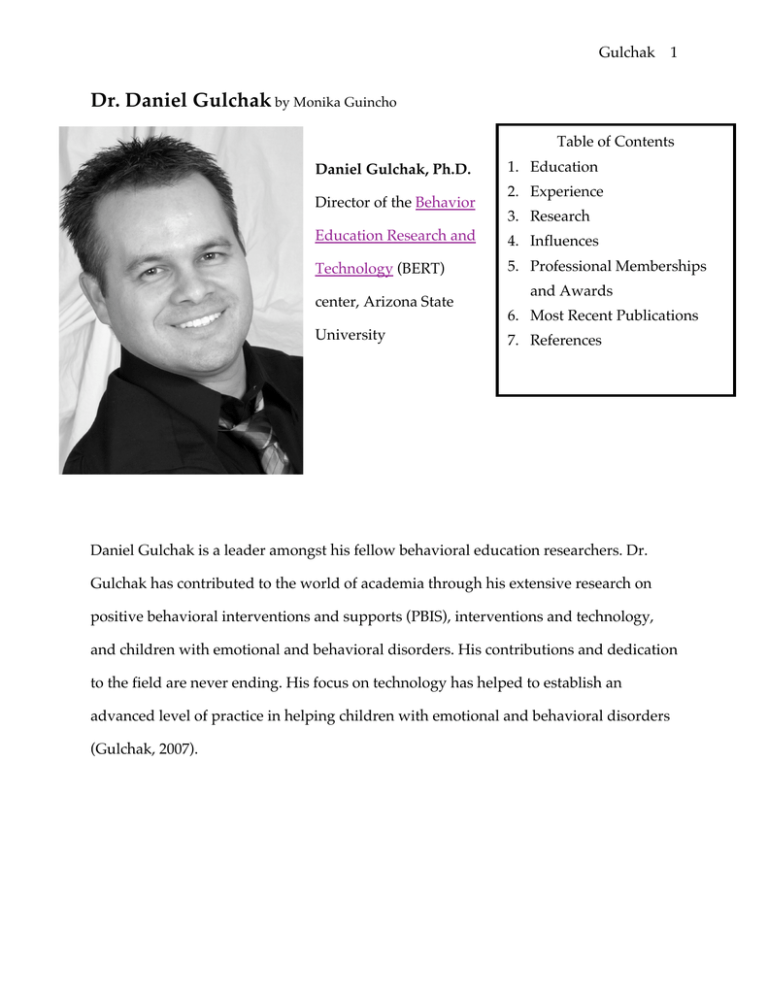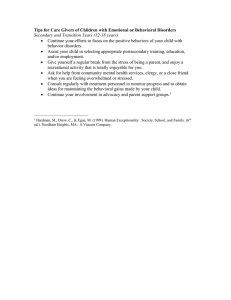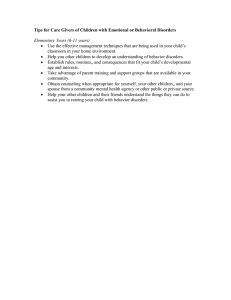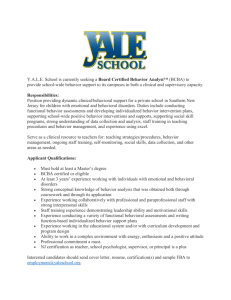Dr. Daniel Gulchakby Monika Guincho
advertisement

Gulchak 1 Dr. Daniel Gulchak by Monika Guincho Table of Contents Daniel Gulchak, Ph.D. Director of the Behavior 1. Education 2. Experience 3. Research Education Research and 4. Influences Technology (BERT) 5. Professional Memberships center, Arizona State University and Awards 6. Most Recent Publications 7. References Daniel Gulchak is a leader amongst his fellow behavioral education researchers. Dr. Gulchak has contributed to the world of academia through his extensive research on positive behavioral interventions and supports (PBIS), interventions and technology, and children with emotional and behavioral disorders. His contributions and dedication to the field are never ending. His focus on technology has helped to establish an advanced level of practice in helping children with emotional and behavioral disorders (Gulchak, 2007). Gulchak 2 Education Dr. Gulchak first began his path in education, graduating in 1993 from the University of Manitoba in Winnipeg, with a Bachelor of Arts in Psychology and Theatre. He furthered his education by attending Minot State University, graduating in 1996 with a Master of Science in Special Education, focusing on Severe and Multiple Disabilities. Dr. Gulchak went on to pursue his doctorate at Arizona State University, graduating in 2008 with a Ph.D. in Special Education, focusing on Emotional and Behavioral Disorders. It was at Arizona State University, where he received the Counsel for Exceptional Children (CEC) Outstanding Student Member Award. (Gulchak, 2007). Experience According to Gulchak (2007), his professional career began as an Independent Living Counselor in Manitoba. While attending the University of Manitoba, Dr. Gulchak assisted individuals in their transition from living in a residential facility, to successfully living independently amongst society. He went on to become a Residential Coordinator of a group home for adults with intellectual disabilities, where he later became the Program Coordinator and Assistant manager. It was during his time working at the group home, that Dr. Gulchak began to focus his career track on special education (D. Gulchak, personal communication, October, 18, 2010). Dr. Gulchak states, “I wanted to know more, I wanted to learn how to help people; more experience did not seem like the answer, I had experience- I wanted knowledge” (personal communication, October 18, 2010). Gulchak 3 Dr. Gulchak began his teaching in 1995 as a Teaching Assistant in Special Education. Over the years, he continued teaching as a special educator, leading courses in mild/moderate mental retardation, severe and multiple disabilities, emotional and behavioral disorders, to his current position as university lecturer (Gulchak, 2007). Dr. Gulchak gained unique experiences in the field of education through his work in the education program of the Indian/Deaf culture of North Dakota. As Project Coordinator, he participated in the development and implementation of educational programs, assisting children who were deaf and a part of the Indian culture in North Dakota (Gulchak, 2007). Soon after working and completing his degrees in North Dakota, Dr. Gulchak ventured to Arizona to continue his education and work experience (Gulchak, 2007). Currently, Dr. Gulchak is the Director of Positive Behavior Interventions and Supports (PBIS) of Arizona at Northern Arizona University. He is also the Director of Behavior Education Research and Technology (BERT) at Arizona State University (Gulchak, 2007). According to Gulchak (2007), “my position as director for BERT enables me to pursue my passion for behavior and building the capacity of educators” (Gulchak, 2007, “Behavior Education Research and Technology (BERT),” para. 1). In describing Dr. Gulchak’s work at BERT, his “workshops and seminars are noted for being practical, humorous, and active” (BERT, 2010). In addition to his current directorial positions, Dr. Gulchak created a very active electronic blog titled “Mr. Chuck Chuck.” Dr. Gulchak’s blog covers an immense amount of information. Specific topics include classroom behavior, educational technology, educational technology research, intervention, legislation, parents, school behavior, special education, and student behavior (Gulchak, 2010). According to Dr. Gulchak, the purpose of the blog is to: Gulchak 4 Share the good news about bad behavior, letting people know that our kids (kids with behavior challenges) can succeed if we learn how to teach them; we don’t have to invent stuff – awesome interventions already exist – I’m just sharing the good news. (personal communication, October 18, 2010). Research Dr. Gulchak emphasizes that the focus of his research agenda is to, “…build the capacity of educators to leverage technologies that enable students with behavior challenges to succeed in school and life” (Gulchak, 2007, “Research Agenda,” para. 1). His research interests include positive behavior interventions and supports (PBIS), school wide systemic change, special education, emotional and behavioral disorders, behavioral management, mobile computers, and research to practice issues (Gulchak, 2007). According to Gulchak (2007), My current focus is leveraging school-wide positive behavior interventions and supports (SW-PBIS) to enable teachers and administrators to teach all students positive behavior expectations. This three-tiered system uses data-based decision-making to target interventions for whole schools, groups of students, and individuals. The technology, which makes this intervention a success, is applied behavior analysis and office discipline referral data analysis. (“Research Agenda;” para. 2) His most recent research studies involve the implementation of technology, particularly PDA-smart phones, as a part of a behavioral intervention for children with emotional and behavioral disorders (Gulchak, 2007). For instance, “a learning disability in spelling does not matter anymore because technology can complete words as you type. Gulchak 5 Word prediction technology is becoming ubiquitous...no need to throw a fit because there is no longer a spelling problem” (D. Gulchak, personal communication, October 18, 2010). With that said, Dr. Gulchak believes that technology provides children with the ability to self-monitor their behavior and emotions, as well as assist children with learning disabilities. He hopes that with the advancements of research, the research will provide professionals with adequate, valid and reliable results supporting technology as a successful intervention (Gulchak, 2007). Influences As previously stated, Dr. Gulchak’s career and education were first influenced by his passion for learning how to help others (D. Gulchak, personal communication, October 18, 2010). Once in school, however, Dr. Gulchak was influenced by a multitude of individuals, each for their own individual traits and characteristics, which he admired. One such individual Dr. Gulchak had the opportunity to study under was Robert Rutherford, Ph.D., one of the most influential pioneers in the field of emotional behavioral disorders (D. Gulchak, personal communication, October 18, 2010). In addition to admiring the work and knowledge of Dr. Rutherford, Dr. Gulchak was also influenced such individuals as Steve Forness for his wisdom and humility, James Kaufmann for his knowledge, Kathleen Lane for her academic perfection, intelligence, and kindness, Alfredo Artiles for his articulation, and John Maag for being an amazing showman (D. Gulchak, personal communication, October 18, 2010). Dr. Gulchak’s career continues to be influenced by the people in his everyday life, as well as the promise for what the future holds in helping others. Gulchak 6 As Dr. Gulchak’s influence and knowledge continues to grow, his aspirations for helping others are relentless, I work hard to accomplish the goals I set for myself and this work ethic comes from my parents. They worked hard to make sure my sister and I went to college. I don’t think they ever imagined that I’d keep going back for more. I can’t wait to see what I decide to do next! (D. Gulchak, personal communication, October, 18, 2010). Daniel Gulchak truly is an inspiration and leader amongst his fellow behavioral education researchers, and throughout fields addressing the needs of children with emotional and behavioral disorders. Professional Memberships and Awards Dr. Gulchak is very active in a variety of organizations. His memberships include the Council for Exceptional Children (CEC), the Council for Children with Behavioral Disorders (CCBD), the Association for Positive Behavior Support (APBS), the International Society for Technology in Education (ISTE), Teacher Educators for Children with Behavioral Disorders (TECBD), and the National Staff Development Council (NSDC) (Gulchak, 2007). Most Recent Publications Dr. Gulchak’s, most recent publications include: Gulchak, D. J. (2008). Using a mobile handheld computer to teach a student with an emotional and behavioral disorder to self-monitor attention. Education and Treatment of Children, 31, 567-581. Gulchak Gulchak, D. J. (2008). The special ways of handhelds: Leveraging the power of technology to help special needs students succeed. District Administration. Gulchak, D. J & Lopes, J. A. (2007). Interventions for students with behavioral disorders: An international literature review. Behavioral Disorders 32, 267281. Rutherford, R. B., Mathur, S. R, & Gulchak, D. J. (Eds.). (2007). Severe behavior disorders of children and youth: Introduction [Special Issue]. Education and Treatment of Children, 30, 1-3. Gulchak, D. J. (2007). Review of the book Students with Emotional and Behavioral Disorders: An introduction for Teachers and Other Helping Professionals, 2nd Edition. Beyond Behavior 17, 32-35. References Behavior Education Research and Technology (2010). About. Retrieved from http://bert.asu.edu/about Gulchak, D. J. (2007). Daniel Gulchak, Ph. D. Retrieved from http://www.danielgulchak.com/DG/Home.html Gulchak, D. J. (2010). Mr. chuck-chuck. Retrieved from http://mrchuckchuck.wordpress.com/ 7






